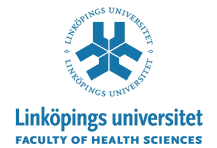 |
Visa svensk kursplan |
|
COURSE CATEGORY Fristående kurs MAIN FIELD OF STUDY SUBJECT AREA |
COURSE CODE | 8FA029 |
By the end of the course the students will be able to:
-Integrate the knowledge on the molecular mechanisms involved in monogenic and polygenic traits to understand the genetic basis of diseases and recognise the interplay with environmental factors
-Explain how concepts of genetic variation in populations are affecting evolution and population genetics
-Demonstrate how calculation of allele frequencies, genetic association and risks from genetic data are achieved and identify ethical problems associated with genetic analyses
-Identify strategies and explain methodological possibilities, interpret experimental results and apply computer-based methods to be able to identify disease genes
-Demonstrate the theoretical basis as well as practically explain selected molecular genetic methodology for gene identification and to present, evaluate and communicate pros and cons of these methods
-Summarise, integrate and assess scientific literature within medical genetics
-Disease gene identification
-How environmental factors influence the genetic material and affects expression
-Genetic variation in populations and its influence on genetic predisposition, molecular/genetic epiodemiology
-Calculation of allele frequencies, association and risk
-Principles of major molecular genetic laboratory methods and interpretation of results, hands-on knowledge of selected methodology
-Seminars on selected scientific papers
The educational method used is problem-based learning (PBL). PBL emphasises the student´s development of free, self-supporting, lifelong learning ability as an instrument for critical inquiry. The students own queries and formulated problems form the basis of PBL. Important is also the student´s ability to take responsibility for his/her own learning, and to seek and evaulate information and knowledge and to train co-operation and a flexible attitude to different views and ideas.
Students who have failed two times on the course or part of the course are entitled to request another examiner at the new examination occasion.
Extent of re-examination
Rules for entries for examination are given in the course plan. Besides are "Regulations regarding examinations and examinators" according to decision Linköpings University DnR: LiU 1109/00-40 applied.
Applicants with a degree from a non-Swedish university must enclose an official examination certificate for at least three years of fulltime studies in subjects with relevance for Life Science, such as biology, chemistry, medicine or corresponding. If English is not the mother tongue of the applicant, he or she must also be able to prove proficiency in English. This may be done by submitting results from an internationally recognised test e.g. the TOEFL-test or prove that the education at basic level has been performed in English. Applications must be supported by official documents issued by a recognised university or other authority.
Planning and implementation of the course shall be carried out from the wording in this course plan. The evaluation of the course should therefore consider the question how well the ccourse agrees with the course plan. The evaluation will be done orally and written at the end of the course. Electronic evaluation of the course in accordance with Linköping University´s regulations will in addition be done (Dnr LiU 780/06-04).
At the student´s request, course certificate is issued by the director of studies for courses or, according to delegation, by the head of the department/director of programme studies. Request for course certificate must be made at specific form (found at the course organiser´s or the educational office).
The course organiser at the Department of Biomedicine and Surgery will provide a list of relevant literature at least two months before the start of the course.
The course is given in such a way that both men´s and women´s experiences and knowledge are made visible and developed.
If the course is closed down, or is subject for major changes, is normally examination according to this course plan offered on totally three occasions within a year, of which one in close connection to the first examination.
|
||||||||||||||||||||||||||||||||||||||||||||||||||||||||||||||||||||||||||||||